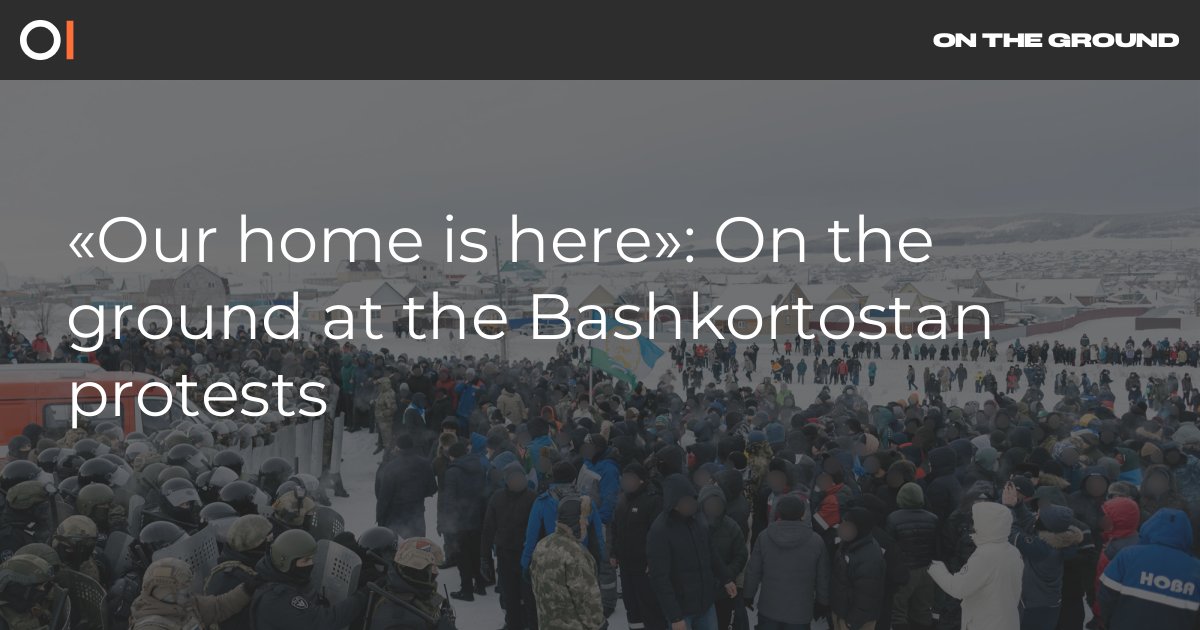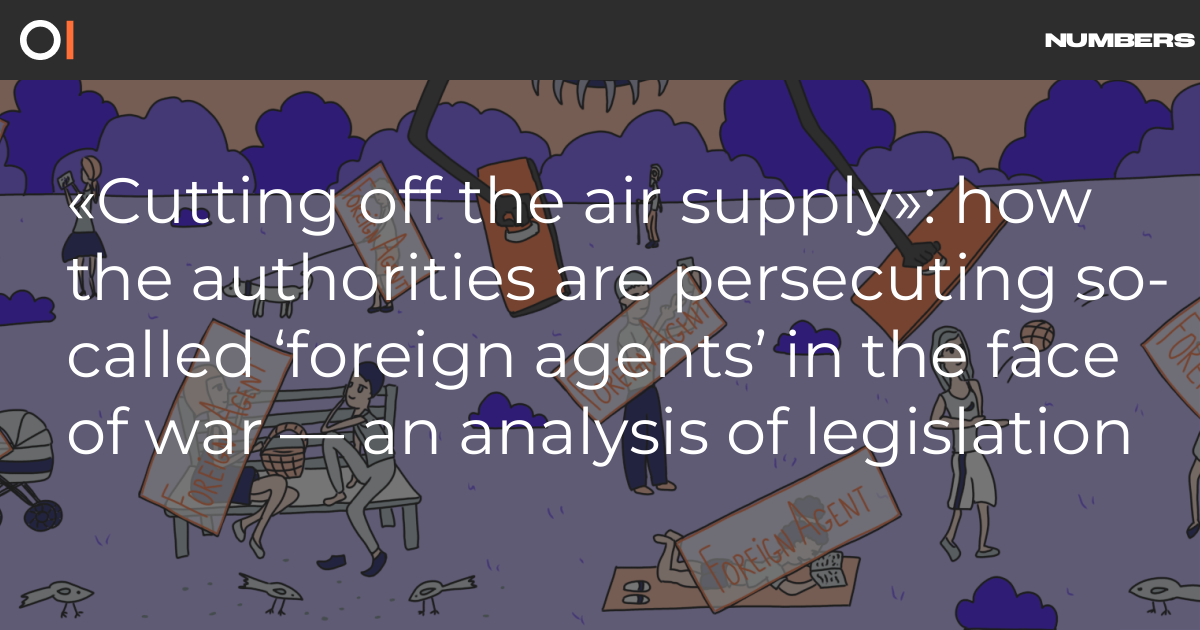Protests in Baymak (Bashkortostan), initiatives of MP Andrei Lugovoi and persecution for violation of public morality — OVD-Info recalls the main events of January 2024.
Protests in support of Bashkir activist Fail Alsynov
 In mid-January, a judge of Baymak District Court in Bashkortostan sentenced local activist Fail Alsynov to four years in prison. The formal reason for the activist’s prosecution was the use of the term 'kara khalyk' in his speech at a protest against the development of a gold mining pit in a nearby village. Police experts stated that in this way he insulted «residents of the North Caucasus or Central Asia». As follows from the case materials, the prosecution of the activist was personally sought by the republic head Radiy Khabirov.
In mid-January, a judge of Baymak District Court in Bashkortostan sentenced local activist Fail Alsynov to four years in prison. The formal reason for the activist’s prosecution was the use of the term 'kara khalyk' in his speech at a protest against the development of a gold mining pit in a nearby village. Police experts stated that in this way he insulted «residents of the North Caucasus or Central Asia». As follows from the case materials, the prosecution of the activist was personally sought by the republic head Radiy Khabirov.
On the date of the verdict thousands of citizens gathered outside the court in support of Alsynov; clashes with police and detentions followed shortly.The Kushtau Bayram telegram channel reported that at least 40 were injured that day, eight of them seriously. Baymak faced network outages, and some media and telegram channels covering the protest were blocked. A few hours after Alsynov’s verdict, the Investigative Committee reported initiation of a criminal case against the protesters under the article on mass rioting. OVD-Info reported in detail on the events of the day.
At this moment we are aware of more than eighty defendants in the criminal case related to the protests in Baymak. Some of them are also accused of using violence against law enforcers. Among the defendants there are people from 18 to 70 years old. Some of the defendants faced violence: Dim Davletkildin, accused of participating in the riots, was hospitalised after being beaten by law enforcers. He was diagnosed with a bone fracture in the spine.
One of the detainees — Rifat Dautov — died. He wasn’t involved in the protests, but two days after Alsynov’s verdict he was waiting for his girlfriend near the place where the rally was held. Later he was summoned to the local police station, and on 25 January detained and taken to an unknown direction. Dautov’s family learnt about the detention only when they received a call from a morgue in Ufa to identify the body. (Ufa is the capital of Bashkortostan, around 300 km from Baymak). Authorities declined to investigate his death, and republic’s head Radiy Khabirov refused to honour Dautov’s memory, saying it was 'disgusting and dishonest'.
Persecution due to anti-war statements
In January we saw more officials getting involved in persecution for disagreement with the war, usually it was an area for the security forces. One of the high-profile stories that month was the detention of a music-band 'Bi-2' in Thailand. The band is known for their anti-war position. Incorrect paperwork was named as a formal reason and the musicians spent a week at the migration police centre before they were able to leave for Israel. According to the musicians and the activists helping them, the Russian Foreign Ministry sought at least 3 of them to be returned to Russia (the rest have other citizenship). MP Andrey Lugovoy posted threats to the musicians on his telegram channel, demanding their extradition and subsequent arrest.
In addition, the Russian Orthodox Church expelled Archpriest Alexey Uminsky, who refused to recite a prayer for Holy Russia during the liturgy (the clergy were obliged to do this after the start of the full-scale invasion). Archimandrite Kirill Govorun was also expelled: he had previously co-authored the declaration of theologians, where the concept of the 'Russian world' was defined as a false doctrine.


OVD-Info maintains a regularly updated infographic about people facing criminal prosecution because of their anti-war position. You can find out how the anti-war repressions developed from December 24, 2023 to January 23, 2024 in our Persecution of the anti-war movement report.
Repressive lawmaking
In just eleven days, the lower house of the Russian parliament swiftly passed a law, from its introduction to the third reading, permitting individuals convicted under repressive articles of the Criminal Code to be stripped of their property, honorary titles, and awards.
'Foreign agents' and 'undesirable' organisations
'Foreign agents'
In early January, two criminal cases of evading the obligations of a «foreign agent» surfaced: one involving the former coordinator of the Golos movement in the Pskov region, Vladimir Zhilinsky, and the other concerning Denis Kamalyagin, the editor-in-chief of the Pskov Province. Such cases are initiated when an individual accumulates two fines within a year under an administrative article for failing to comply with the obligations of a «foreign agent.» By the end of the previous year, at least 57 individuals were on the brink of criminal prosecution under this article.
Administrative cases against «foreign agents» typically arise due to a lack of «foreign agent» reporting or proper labelling. Last month, such a fine was imposed on the former editor-in-chief of Echo of Moscow radio station, Alexey Venediktov, due to a poll on Telegram, despite the absence of technical capability to «label» the poll in the messenger.
OVD-Info released a report titled «„Cutting off the air supply“: how the authorities are persecuting so-called ‘foreign agents’ in the face of war», detailing new additions in relevant legislation and law enforcement practices.
'Undesirable' organisations

In January, the Prosecutor General’s Office did not announce the emergence of new «undesirable organisations», but relevant press releases were issued by MPs Vasily Piskarev (regarding the banning of the student publication DOXA) and Andrei Lugovoy (regarding the banning of The Russian Anti-War Committee). Towards the end of the month, three organisations: the Global Giving platform and two German-registered departments of «Free Russia», suddenly appeared on the «undesirable» organisations list on the Ministry of Justice’s website without prior warning.
Nadezhda Nizovkina, a human rights lawyer from Ulan-Ude, a major Siberian city, was fined for involvement in the activities of an «undesirable» organisation due to a comment she made to TV Rain regarding her client Natalia Filonova’s case. During the TV Rain broadcast, Nizovkina discussed how after her client’s mother was arrested, Filonova’s son was placed in an orphanage where he suffered abuse and beatings.
'Extremist' organisations and communities

In 2024 Russian courts persist in convicting Jehovah’s Witnesses of organising or participating in the activities of extremist organisations. In Cherkessk, Togliatti, Prokopyevsk (Kemerovo region) and Shuya (Ivanovo region), their followers received non-prison sentences. In Samara, four Jehovah’s Witnesses were each sentenced to seven years' in prison: they were deemed organisers of the activities of the local religious community.
In the Altai Republic, searches were conducted as a part of an extremism case involving alleged members of the religious group Allah-Ayat, whose participants preach alternative approaches to medicine.
Three elderly from Volgograd were sentenced to actual prison terms in the case involving the 'Committee of Security of Russia': law enforcement officers believed that the men were planning to «restore the USSR by violent means.»
Pressure on Alexei Navalny and his supporters
Criminal cases on financing extremist activities were initiated in the Vologda and Saratov regions due to Anti-Corruption Foundation (FBK) donations of one thousand (US$11) and two hundred rubles (US$2), respectively. Vologda activist Yevgeny Motolov was sent to the pre-trial detention centre.
The founder of the organisation, Alexei Navalny, was placed in the solitary confinement for the twenty-fourth and twenty-fifth time: he was sent to the punishment cell immediately after leaving the quarantine he was undergoing after arriving at the colony in Kharp (Yamalo-Nenets Autonomous District). The politician’s lawyers Olga Mikhailova and Alexander Fedulov were put on a wanted list. Mikhailova became a defendant in a case of participation in an extremist community.
Persecution related to freedom of speech
Administrative prosecutions
In January, the reasons for administrative fines under articles restricting freedom of speech, among others, were:
- Jacket with the inscription «Russia without Putin»;
- The song 'Last Call' (Oxxxymiron);
- The article «Why can’t Russia develop?»;
- A car licence plate faded due to the sun (law enforcers saw a white-blue-white flag, which was used widely by anti-war protesters);
- A poster with the inscription «YOU’RE FUCKED».
Cases of calls for terrorism, extremism and anti-state activities
«Bring the cocks back from the front!» — this caption under a picture in Odnoklassniki (local Russian social network) led to the arrest of the Uzbek community’s leader in Moscow, Usman Baratov. Criminal cases were initiated in Barnaul and Kostroma due to statements about drone attacks on the business centre 'Moscow-City'.
Astrakhan resident Sergei T. became a suspect in a case of inciting terrorism for appealing to the authorities of Kazakhstan, asking them to free the region «from Putin’s fascist regime».
According to the prosecution, St. Petersburg resident Alexey Donetsky on VKontakte urged to gather addresses of law enforcement officers, «but not hitting them yet»: he was given a three-year suspended sentence in January. A military man from Vladivostok was sentenced to a real prison term for discussing the explosions on the Crimean Bridge with his colleagues.
The former 'Minister of Defense' of the self-proclaimed DPR (The Donetsk People’s Republic) Igor Girkin (Strelkov) was also unlucky: he was sentenced to four years in prison because of a negative post about his former colleagues. The coordinator of the «Left Front» Sergei Udaltsov was sent to a pre-trial detention centre as a suspect in the case of justifying terrorism due to publications in support of those involved in the case of the Ufa Marxist circle.
Cases on the 'rehabilitation of nazism'
A Krasnodar resident Vladimir Yarotsky was sentenced to a year and half in prison for a picture featuring Putin, a penis and the St. George’s ribbon (a respect symbol to veterans of World War II in Russia). A criminal case was initiated against Ryazan resident Maxim M. for calling May 9th the 'holiday of death' under the article on the rehabilitation of Nazism.
Persecution related to freedom of assembly
In January, mass arrests took place at rallies in Baymak (Bashkortostan) and Yakutsk (Yakutia). In the latter case, people demanded an investigation into the murder of a local resident. In Novosibirsk, Krasnodar and Ufa, local residents were not allowed to hold protests on problems with housing and communal services. In Tomsk, a rally was not allowed in support of the ex-head of Navalny’s local headquarters, Ksenia Fadeeva, who was previously sentenced to nine years in prison.
Security forces continued to pressure supporters of the Khabarovsk Krai ex-governor Sergei Furgal. They continued to meet weekly to demand his release. In early February, it was reported that the prosecutor’s office filed a lawsuit to recognize the movement «I/We Sergei Furgal» as an extremist organisation.
Supporters of politician Boris Nadezhdin, who collected signatures for his nomination for the post of President of Russia, were detained in Samara, Obninsk, Saratov, Novosibirsk, Moscow, Krasnodar and Krasnoyarsk. On 8 February, the Central Election Commission denied Nadezhdin registration; he plans to appeal this decision to the Supreme Court.
Pressure on the LGBTQ community
On 10 January the Supreme Court’s decision to recognize the «international LGBT movement» as an extremist organisation went into force. A week later, the Svobodnye Novosti news agency published the full text of this decision. The document revealed that, according to the Russian authorities, 'LGBT' began its work in Russia in 1984, and its members are united by 'certain customs', features of the choice of sexual partners, common interests, and «the use of potential feminist words.»

In February arrests began and fines were issued in many Russian cities for featuring the rainbow flag as a symbol of extremism. A girl from Nizhny Novgorod, a city in central Russia, was sent under arrest for five days because she wore frog-shaped rainbow earrings.
OVD-Info chronicles the pressure on members of the LGBTQ community after the adoption of an expanded 'propaganda' law.
Forceful defence of 'public morality'
After the 'almost naked' party organised by blogger Nastya Ivleeva in December, a wave of persecutions against celebrities suspected of 'immoral' behaviour began in Russia. OVD-Info is keeping track of the pressure related to this. In January, one of the party participants, rapper VACÍO (Nikolay Vasiliev), faced repeated administrative arrest, having been charged twice with minor hooliganism. After serving the first arrest, the young man received a summons to the military enlistment office, and after the second, he went there to get registered for service.
The founder of the groups 'Pasosh' and 'Prygai kiska' ('Pussy, jump'), Petr Martic, was fined in absentia under the article on drug propaganda and ordered to be expelled from Russia (Martich is a Serbian citizen). Yaroslavl (a city in central Russia) rock musician Nikolai Mamaev (known as Cupsize) was fined under the same article. The reason was eight songs, in particular a composition called 'Ya skhaval opiat' ('I swallowed an opiate'). At the moment, posts on his page on VKontakte have been deleted. The musician also wrote a letter of apology to the head of the Safe Internet League, Ekaterina Mizulina.
Repressions against annexed Crimea residents
Crimean resident Aleksandr Tyurenko received two years of a suspended sentence for urinating on the monument in the form of Z and V in an alley dedicated to the Russian invasion of Ukraine saying «There’s such a monument, total bullshit.»
Security forces burst into the house of lawyer and deputy chairman of the electoral commission of the Crimean Tatars Kurultai, Nazim Memetov, to conduct a search for the case of illegal sale of firearms. Mametov himself called the incident «an act of intimidation.»
Repression on imprisoned Crimean Tatars continues. Server Zekiryaev — defendant on one of the cases of Islamic group Hizb ut-Tahrir — is kept in a cell-type room for two months and is denied long-term family visits. Defendant on a similar case Ekrem Krosh told about tortures he had faced in pre-trial detention. A year ago he was beaten up with a stun gun and forced to sing a Russian hymn. Convicted in the Hizb ut-Tahrir cases Rustem Sheikhaliyev and Teymur Abdullaev reported their declining health.





